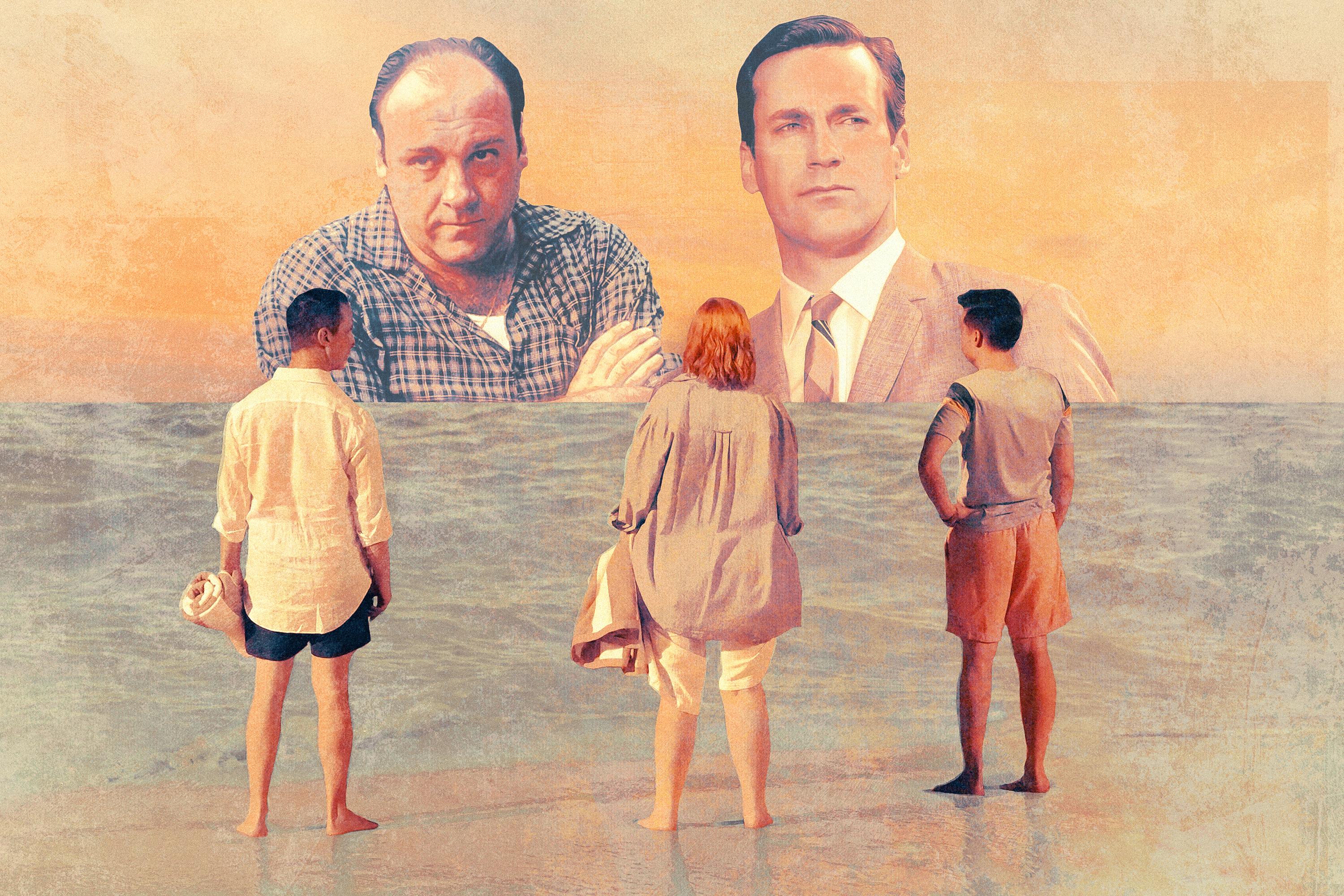How Will ‘Succession’ Be Remembered?
The HBO series concluded its run on Sunday night. But where does it stack up among other prestige TV offerings? And how will its legacy differ from those of other shows under that umbrella?
It’s a question of cynicism, isn’t it? Whatever else Succession became over the four strange seasons of its existence—and it became a lot of things: a discourse bomb, a cultural Rorschach test, the meme capital of the universe—it was always first and foremost a show about human aspiration and whether aspiration can ever find an object worth the effort of pursuing it. Does anything matter? Does anything have real value? Across five years, we watched the Roys and their retinue single-mindedly chase after their desires, only to find that success and failure left them more or less equally bummed out. Sometimes, losing even looked more exciting than winning; if you’re in pain, as Roman’s masochistic streak repeatedly reminded us, at least you’re feeling something.
None of the sex on Succession was sexy. None of the weddings were romantic. None of the parties were fun. None of the relationships were supportive. None of the houses were comfortable. None of the style was cool. The dialogue was very, very funny, but on the whole, the Roys’ world was so desaturated, so anesthetic, and such a bland montage of interchangeable stock photo luxury backdrops that only repetition compulsion could explain why they were so hell-bent on ruling it. Their universe was nothing, as Roman said to Kendall in a crucial scene in the finale. It was bullshit. Why go to the trouble of betraying everyone you love when the only reward is another gray conference room and another chat with Karl?
Please don’t misunderstand me. I’m not criticizing Succession here. I think Succession was a brilliant show—maybe the best-written series, at the line level, that I’ve ever seen. But I’m wondering how we’re going to remember it in a few years’ time, once the hype cycle fades, once the discourse around Fox News and democracy is (please, God) very different, once we’re able to consider Jesse Armstrong’s creation alongside the other skyscrapers of prestige TV history. (A very Succession image: white clouds reflected in blank glass.) How will it hold up compared to Mad Men, The Wire, Breaking Bad, The Sopranos, and so forth? It’s an impossible question to answer, of course, but it’s interesting to me, partly because Succession seems to have been so clearly made in the prestige TV mold and partly because it seems so different from every other show in that mold. I also think, for reasons I’ll get into in a minute, that the question of how we’ll remember Succession is primarily a question about cynicism—not the Roys’ this time, but ours.
But let’s talk about the Roys for a second. Succession is a complicated show when it comes to form and genre, but above all else, it’s a psychoanalytic satire of the superrich. And in the same way that almost everything the Roys say revolves around textbook—even cartoonishly textbook—Freudian obsessions with sex, violence, and bodily functions, almost everything the Roys do is driven by textbook Freudian motives. Kendall wants to kill his father and replace him. Roman wants to submit to him and be punished. Shiv wants to marry him. (And so, in the finale, Kendall tries and fails to seize power, Roman has his wound literally reopened, and Shiv drives off holding hands with the CEO of Waystar.) In a world where running Waystar Royco looked like a fun and satisfying thing to do, all the Civilization and Its Discontents stuff might have gotten lost. We’d have assumed everyone was competing for the crown because the crown itself was so nice. Rational behavior! But against Succession’s overwhelming atmosphere of high-end hopelessness, in which the characters are essentially guaranteed to be unhappy no matter how much power they obtain, the psychological tropes become starkly visible. The crown is made of tinfoil; the only reason to chase it is because childhood trauma is compelling you to.
And this realization, in turn, is the source of the show’s odd satiric power. It’s odd because—well, I don’t know about you, but I wouldn’t necessarily have looked at our era of fake news, environmental degradation, rising income inequality, faltering trust in institutions, and vanishing democratic norms and thought, “It’s clear that this is all happening because some rich kid has an Oedipus complex.” On the other hand, contemporary reality is just about hallucinatory enough to justify turning to the master of dream interpretation to explain it. And as Succession never tired of reminding us, the stupidest explanation is very often the truest.
The Roys’ world had to be awful for their real narrative arcs—not bold struggles for power, but sad reenactments of childhood pain—to be fully traceable. And their narrative arcs had to be fully traceable because of the many ways in which they mirror those in our own world. Succession wanted us to see that our persecutors are often not evil geniuses with complex master plans. They’re hapless babies, consumed by their own emotions and acting on spur-of-the-moment impulses. (Yes, Logan too.) Armstrong and his cowriters showed us this again and again, often hilariously (“We here for you”), sometimes chillingly (“Dad, he’s box office”), and occasionally with offhand insight that seemed 50 miles deep (Kendall’s relationship with Stewy is probably the most efficiently devastating look at how elite networks function that you’ll ever see on television). But it all goes back to that original Freudianism, and one of Succession’s quiet ironies—in a show that contained many loud ironies—is that it became the most psychoanalytically inflected prestige TV show even though the original prestige TV show, The Sopranos, included psychotherapy as a basic plot element and occasionally featured episode-length dream sequences.
Speaking of The Sopranos, can we take a second to talk about that term, “prestige TV”? It’s a useful catchall (and also the name of a very good Ringer podcast!), but something about the phrase has always made me squirm a little. I’m trying to understand why that is. When I think back to the television of the early 2000s, what I remember most strongly is a feeling of optimistic excitement, a sense of new possibilities opening up. Rightly or wrongly, TV had not, to that point, been seen as a medium for work of real artistic value. Then, suddenly, it was. New forms were emerging that felt vital and urgent and expansive. The shows were often dark, but the milieu was thrilling. You felt that these series were telling you something you’d never heard before, something you needed to know. What The Sopranos said about self-delusion, what The Wire said about corruption, and what Deadwood said about American history seemed to open your mind to something new. It seemed to mean something. It seemed to matter.
Over time, of course, these shows would be critiqued for moral, political, and aesthetic shortcomings that were largely invisible to us at the time, maybe because we didn’t want to see them: their obsession with male antiheroes, their frequent confusion of violence and profundity, their cultish elevation of showrunners who were later included in accounts of harassment and other misdeeds, the sort of White Boomer Dad Getting Down to the Real Shit vibe that many of them (OK, all of them) seemed to possess. At the same time, television is a copycat industry. Breathless rounds of think pieces asking whether TV was “the new novel” spawned waves of shows that looked and felt kind of like Breaking Bad or The Wire but that often lacked their depth and sophistication. Series that were aiming to be high art—or at least to reach an audience that was now thought to be interested in high art—became recognizable by a set of common attributes. They had a lot of sex, violence, and profanity; they had expensive-looking HD cinematography; they were mostly hour-long dramas about problematic men; they were often on HBO; they played cool and unexpected songs over their closing credits; they had serial plots that unfolded over seasons that were between 10 and 13 episodes long; and they tackled grown-up themes like crime (The Shield, Peaky Blinders, Boardwalk Empire), race (Fargo, Watchmen), technology (Mr. Robot), and whether the notion of eternal recurrence promulgated by the German philosopher Friedrich Nietzsche did or did not encompass the McConaissance (True Detective).
Some of these shows were excellent. But enough of them were not excellent that it started to seem as if making good art was not necessarily the aim of the people who made shows like these. The real aim was to deploy the external trappings of good art in a bid to capture the rewards that go to people who make good art: the Emmys and the New Yorker profiles and the high cultural status. Art wasn’t the point; prestige—that word, again—was.
Talking about “prestige TV” rather than good TV became a way to take the thorny question of aesthetic value out of the conversation. It was a way to sidestep difficult political discussions about representation and genre and how we distribute cultural spoils. But the faint derisiveness of the term also seemed to mark its user as more in the know, hipper, less naive about human motives. It was a way to talk about art that showed you weren’t enough of a sap to think art was really the goal. It showed you understood that the only things people really care about are gossip and money.
And I think that’s why I feel a little queasy about the term “prestige TV.” It seems to contain its own quiet cynicism. It’s so dismissive of the artistic potential of the medium of television, something I’d very much like writers and showrunners to go on believing in. “Prestige TV” is a phrase that could have sprung from the world of Succession itself (though I’m sure Roman would have called it, like, “sorry fucking national critics circle jerk, founding myth of America’s suburban angst and bison skulls whatever—I don’t care”). It implies that artistic value, like all abstract value, is bullshit; what really matters is status and power. This is not what I believe, and if it was, I’m not sure why I’d ever want to watch television. To live tweet it, I guess?
Here’s something I keep thinking about, though. I keep thinking about the fact that the runaway success of Squid Game—the excoriating Korean satire in which the hope of winning a jackpot prompts financially desperate people to join a secret competition in which they play children’s games, despite knowing that the losers will be killed—prompted Netflix to create a real-life game show. Netflix really looked at this crushing, bloody satire of income inequality and said, “This proves that our audience wants to watch grown-ups playing children’s games, dangerously.” (The show’s conditions were later criticized by contestants as “cruel” and “inhumane.”)
In a cynical moment, it can be hard to distinguish the satire from the object of the satire. It can be easy to respond to a show’s visceral conflict and hard to respond to the moral critique underlying it. A huge part of the conversation around the Succession finale centered on the question of who had “won” the show. Who conquered the chessboard? Who maneuvered most successfully into power? (Weirdly, a lot of people seem to think this was new Waystar CEO Tom Wambsgans, despite him being explicitly hired as a “pain sponge” by a boss who only turned to him after Shiv promised that he’d “suck the biggest dick in the room.” Victory!) The point is that when we take the inherent cynicism of prestige TV discourse, which is so reluctant to see art as having intrinsic value, and combine it with the inherent cynicism of the Succession narrative, which is so reluctant to see anything as having intrinsic value, we make it very tricky to see the show as anything but a kind of dystopian sporting event. Which is maybe why a lot of people who are currently calling Succession one of the greatest shows of all time also seem to think it matters who runs Waystar Royco. It’s maybe, for that matter, why a lot of people seem to be interested in what clothes the Roys wear and what countries they vacation in, I guess on the general American belief that no one can be miserable in a swimming pool. (An idea Kendall repeatedly dispelled.)
Of course, this sort of confusion isn’t new in the Peak TV era. Every show about a problematic antihero risks creating it, because every show about a problematic antihero wants to hook the audience with one kind of visceral excitement (Tony Soprano is choking someone with his bare hands!) and then lecture them about how immoral this kind of visceral excitement really is (Tony Soprano should not be choking someone with his bare hands!). It’s fascinating to me, though, that most of Succession’s forebears were drawn to the question of whether broken, hurtful people could ever achieve redemption, while Succession never really ventured in that direction. Tony Soprano and Walter White and Don Draper were all conscious, at times, of a desire to make amends, to be honest with their loved ones, to fix the damage they’d done. This consciousness came with varying levels of self-delusion, and none of these shows fully forgave their protagonists in the end. But the possibility of redemption existed for them at least notionally, and I think that’s why Succession seems like such an outlier among its peers. There was simply never any chance that any of these characters could be redeemed, because their world didn’t include enough goodness or enough faith for the concept of redemption to make any sense.
It’s telling, though, that the redemption arcs on these older series tend to be the aspects that viewers today are most cynical about, or at least most uncomfortable with. The characters on Mad Men seem an order of magnitude less evil to me than those on, say, The Sopranos. They cheat on their spouses; they don’t shoot their friends in the head. But I’ve talked to many more people who can’t watch Mad Men because “The characters are so awful” than people who I’ve heard say anything similar about The Sopranos. My theory is that this is because the characters in Mad Men feel guiltier about the bad things they do. They’re more conscious of their misdeeds, which makes us more conscious of them, which makes them harder to take. The characters on Succession seem both guilty and unconscious—a strange combination—but they’re never offered any hope of real change. I think Succession will be remembered as a great show. But whether it’s remembered as a devastating satire of an ugly moment in American history or as an early preview of what we ourselves are becoming will depend on whether we decide that it’s all nothing and all bullshit or that it isn’t. It will depend on whether we have more luck finding the hope of real change or real redemption than the Roys did.


